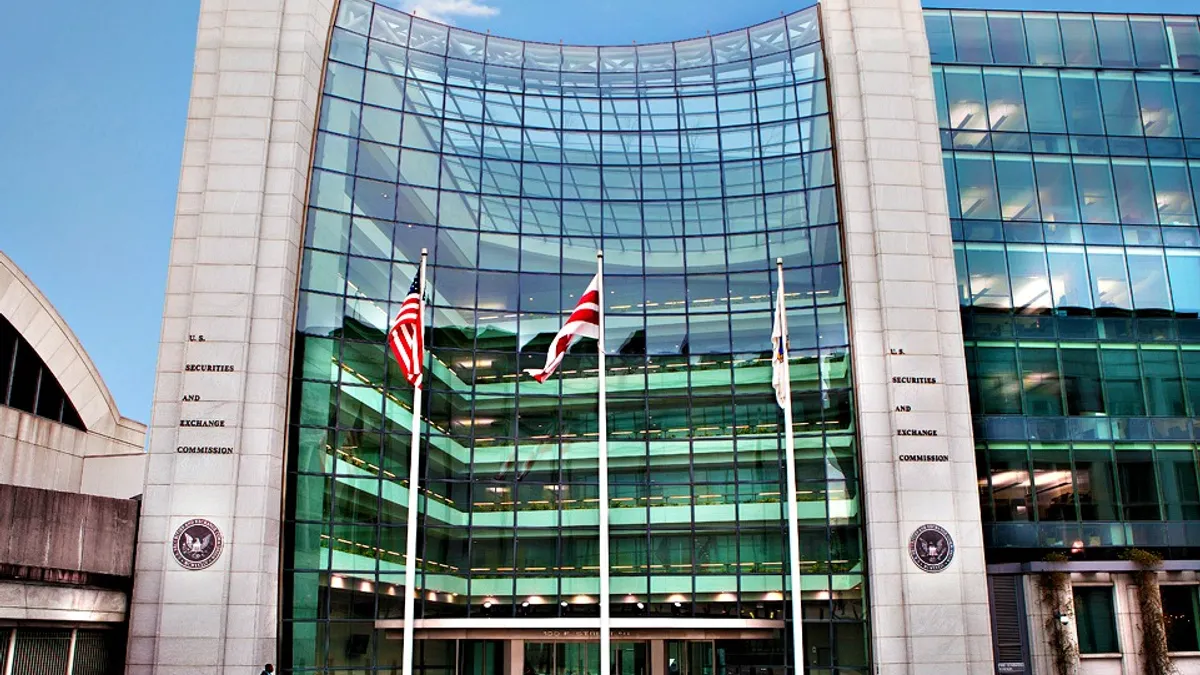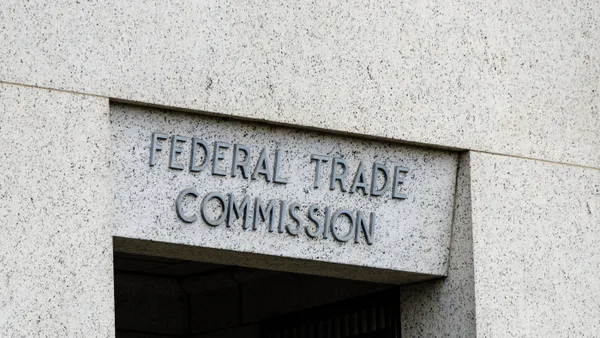Dive Brief:
- The Securities and Exchange Commission (SEC) took 697 enforcement actions against companies in fiscal year 2021, the agency announced.
- As a result of the actions, companies paid just under $2.4 billion in disgorgement and a record $1.4 billion in penalties. Many of the cases were aided by the agency's whistleblower program, which paid out $564 million in rewards to 108 insiders.
- "As these results show, we go after misconduct wherever we find it in the financial system," said SEC Chair Gary Gensler. "[We're] holding individuals and companies accountable, without fear or favor, across the $100-plus trillion capital markets we oversee."
Dive Insight:
For the first time in a decade, not a single public company charged in an enforcement action pleaded guilty, according to an analysis by Cornerstone Research and New York University’s Pollack Center for Law & Business.
Stephen Choi, who helped lead the research, said companies might plead guilty more frequently going forward because of changes the SEC announced in October to its so-called no-admit, no-deny policy. Under the changes, the SEC will rely less on settlements in which companies neither admit nor deny guilt.
“It will be interesting to see if this trend changes," said Choi, "as the SEC [seeks] admissions in certain cases as a way to improve the deterrent value of enforcement actions.”
Critics have called no-admit, no-deny a kind of gag rule that should be abolished.
Notable cases
In its report, the SEC highlighted some of the enforcement actions it took during the fiscal year. The penalized companies include a number of big names:
- General Electric for violating antifraud, reporting, disclosure controls, and accounting controls provisions.
- Kraft-Heinz and two former executives for a years-long expense management scheme.
- A TIAA-CREF’s subsidiary for alleged violations in retirement rollover recommendations.
- China-based Luckin Coffee for allegedly defrauding investors about its financial condition.
- Robinhood Financial for misleading customers about its compensation for routing customer orders.
- AT&T and three investor relations executives with selectively providing information to Wall Street analysts.
- Ernst & Young and three partners for auditor misconduct.
- Under Armour; Sequential Brands Group; and SAExploration Holdings for alleged violations.
- The Cheesecake Factory for improper disclosures about the impact of the COVID-19 pandemic on its operations and financial condition.
The report also called out executives for their role in causing their company's violations. Among them were the former CEO and chairman of Wells Fargo and the former head of Wells Fargo’s community bank; the founder and former CEO of alternative fuel truck manufacturing company Nikola; the former CEO and CFO of WageWorks; and the former CEO and CFO of FTE Networks.
The SEC also highlighted actions it took against auditors, the watchdogs whose job is to help companies comply with accounting and reporting requirements. Among its actions, the agency –
- Suspended two former KPMG auditors for alleged improper professional conduct during the audit of the not-for-profit College of New Rochelle.
- Charged a CPA with failing to register his firm with the Public Company Accounting Oversight Board (PCAOB) and failures in auditing and reviewing the financial statements of a public company client.
- Charged an audit firm partner for allegedly engaging in improper professional conduct during audits of a public company client.
- Charged two attorneys for their roles in an alleged scheme to fraudulently facilitate the sale of millions of shares of microcap securities to retail investors.
- Barred a securities lawyer from practicing or appearing before the SEC.
Access SEC enforcement statistics.












